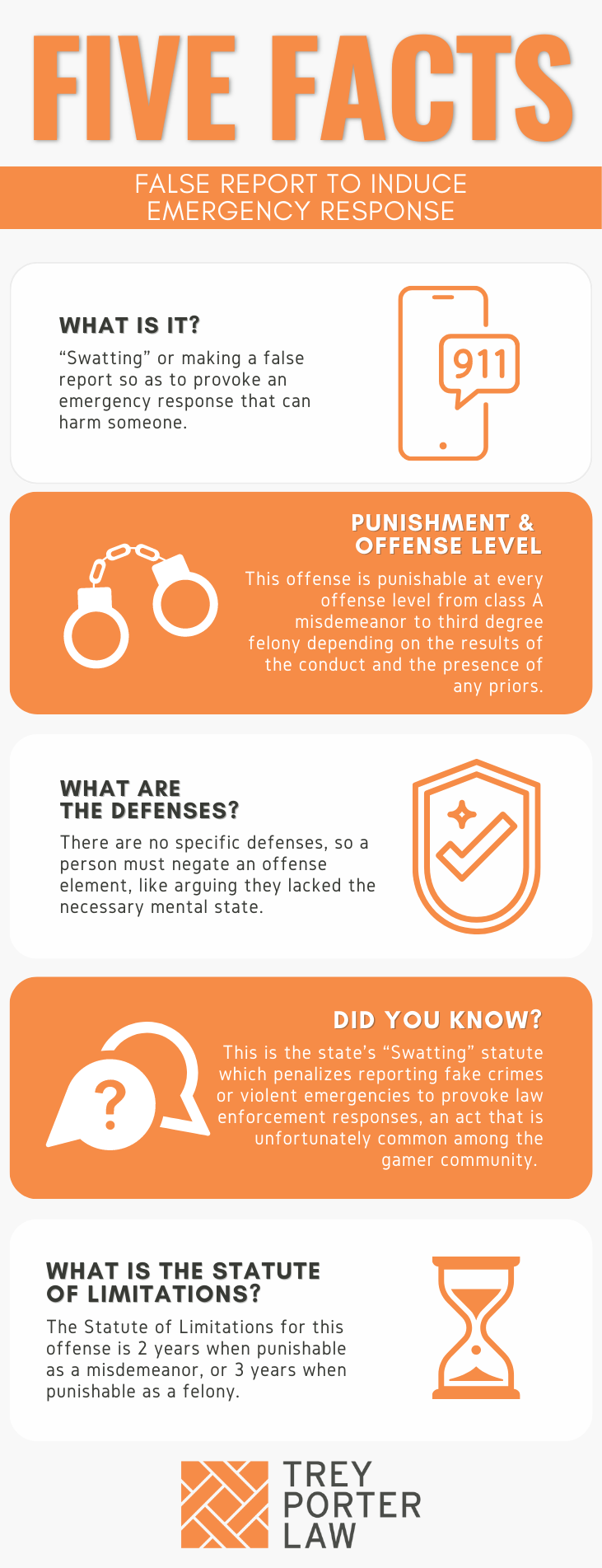WHAT IS FALSE REPORT TO INDUCE EMERGENCY RESPONSE IN TEXAS?
The Texas law against false report to induce emergency response prohibits “swatting,” or knowingly reporting a false emergency or crime to law enforcement that causes an emergency response, if the reporting person is reckless about whether another could be injured.
- What is “swatting”? “Swatting” is a prank call to law enforcement falsely reporting a serious emergency to send police or other emergency responders to another’s home or other location. Examples include false bomb threats, murders, hostage situations, and other emergencies to trigger a drastic response. “Swatting” has resulted in law enforcement pointing guns at unknowing citizens based on their belief they are responding to violent situations. It has also caused injury or death in some circumstances.
WHAT IS THE FALSE REPORT TO INDUCE EMERGENCY RESPONSE LAW IN TEXAS?
Tex. Penal Code § 42.0601. FALSE REPORT TO INDUCE EMERGENCY RESPONSE.
(a) A person commits an offense if:
(1) the person makes a report of a criminal offense or an emergency or causes a report of a criminal offense or an emergency to be made to a peace officer, law enforcement agency, 9-1-1 service, official or volunteer agency organized to deal with emergencies, or any other governmental employee or contractor who is authorized to receive reports of a criminal offense or emergency;
(2) the person knows that the report is false;
(3) the report causes an emergency response from a law enforcement agency or other emergency responder; and
(4) in making the report or causing the report to be made, the person is reckless with regard to whether the emergency response by a law enforcement agency or other emergency responder may directly result in bodily injury to another person.
(b) An offense under this section is a Class A misdemeanor, except that the offense is:
(1) a state jail felony if it is shown on the trial of the offense that the defendant has previously been convicted two or more times of an offense under this section; or
(2) a felony of the third degree if:
(A) the false report was of a criminal offense to which a law enforcement agency or other emergency responder responded; and
(B) a person suffered serious bodily injury or death as a direct result of lawful conduct arising out of that response.
(c) If conduct constituting an offense under this section also constitutes an offense under another section of this code, the actor may be prosecuted under either section or both sections.
(d) This section may not be construed in any manner to conflict with 47 U.S.C. Section 230 or 42 U.S.C. Section 1983.
WHAT IS THE PENALTY CLASS FOR FALSE REPORT TO INDUCE EMERGENCY RESPONSE IN TEXAS?
False report to induce an emergency response, without aggravating factors, is a Class A misdemeanor, punishable by up to one year in jail. Falsely reporting an emergency becomes a state jail felony, punishable by 180 days to two years in a state jail facility, if the person has two previous convictions for the same offense. If a person falsely reports a crime, and someone is killed or suffers serious bodily injury, it is a third degree felony, punishable by two to ten years in prison.
WHAT IS THE PUNISHMENT RANGE FOR FALSE REPORT TO INDUCE EMERGENCY RESPONSE IN TEXAS?
The punishment range for false report to induce an emergency response corresponds to the severity and previous convictions.
- Third degree felony (two to ten years in prison, maximum fine of $10,000):
- If someone is killed or suffers serious bodily injury as a result of the false report;
- State jail felony (180 days to two years in a state jail facility, maximum fine of $10,000):
- If the accused has two previous convictions for false reports to induce an emergency response;
- Class A misdemeanor (up to one year in jail, maximum fine of $4,000): all other false reports to induce an emergency response.
WHAT ARE THE PENALTIES FOR FALSE REPORT TO INDUCE EMERGENCY RESPONSE IN TEXAS?
A person charged with false reports to induce an emergency response may be eligible for probation after a conviction, or deferred adjudication without a conviction. The maximum term of community supervision for a Class A misdemeanor is two years. The supervision period for a state jail felony is between two and five years, with the possibility of extending supervision for up to ten years. The community supervision term for a third degree felony may not exceed ten years.
WHAT ARE THE DEFENSES TO FALSE REPORT TO INDUCE EMERGENCY RESPONSE IN TEXAS?
The statute does not authorize specific defenses to false report to induce an emergency response. A person accused thereof may attempt to negate at least one of the elements the State must prove at trial.
WHAT IS THE STATUTE OF LIMITATIONS FOR FALSE REPORT TO INDUCE EMERGENCY RESPONSE IN TEXAS?
The limitation period for a Class A misdemeanor false report to induce emergency response is two years. For state jail felony and third degree felony false reports, the limitation period is three years.
FALSE REPORT TO INDUCE EMERGENCY RESPONSE IN TEXAS
The Texas Legislature enacted the law against false report to induce an emergency response in 2021 to criminalize the widespread “swatting,” or falsely reporting emergencies to incite an extreme reaction by law enforcement. The law enhanced the penalty for false reports if someone is injured or killed as a result, and created enhancements for repeatedly engaging in the conduct.













